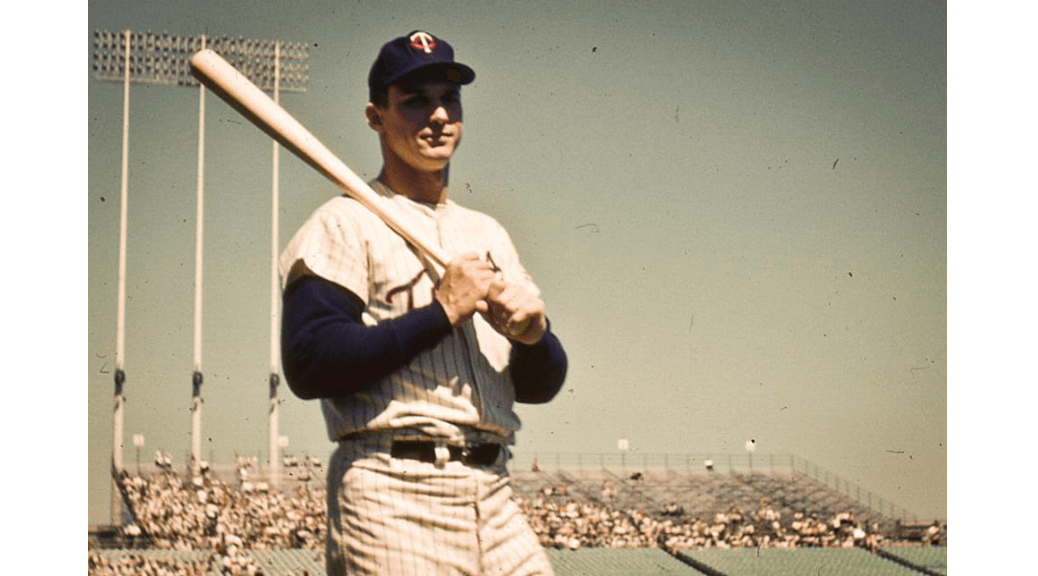MINNESOTA 7, CLEVELAND 5 IN MINNESOTA
Date: Monday, September 1.
Batting stars: Bob Allison was 2-for-4 with a triple and four RBIs. Tony Oliva was 2-for-4 with a triple and two runs. Leo Cardenas was 2-for-4. Rick Renick was 1-for-4 with a two-run homer, his third.
Pitching star: Ron Perranoski pitched 2.1 scoreless innings, giving up a hit and a walk.
Opposition stars: Stan Williams struck out six in five shutout innings of relief, giving up three hits and a walk. Tony Horton was 3-for-5. Lou Klimchock was 2-for-3 with a double and two runs. Vern Fuller was 2-for-4.
The game: Singles by Klimchock and Frank Baker were followed by an error, giving the Indians a 1-0 lead. The Twins responded in a big way, scoring six runs off Cleveland starter Sam McDowell before anyone was retired. Cesar Tovar led off with a double and Oliva singled him to third. Harmon Killebrew walked to load the bases and Allison responded with a bases-clearing triple. Cardenas singled him home and Renick followed with a two-run homer, putting the Twins up 6-1. The Twins got one more in the second when Oliva tripled and Allison singled, making the score 7-1.
McDowell came out after two innings and the Twins did not score again. Meanwhile, the Indians tried to chip away at the Twins' lead. In the third, Klimchock doubled, went to third on Horton's infield single, and scored on an error to make it 7-2. In the fourth, singles by Eddie Leon and Fuller, a bunt, and a Russ Snyder two-run single cut the margin to 7-4.
Twins starter Dean Chance then settled down and retired the next eight batters before being pulled for a pinch-hitter in the bottom of the sixth. Jim Kaat came on to pitch the seventh and gave up consecutive one-out singles to Larry Brown and Chuck Hinton. Al Worthington gave up an RBI single to Horton to make the lead 7-5 before recording the second out of the inning. Perranoski came in to nail down the victory. It was not without a little drama, though--with two out in the bottom of the ninth, Hinton walked and Horton singled, bringing the go-ahead run up to bat. Ken Harrelson flied to center to end the game.
WP: Chance (5-2). LP: McDowell (15-12). S: Perranoski (26).
Notes: Rod Carew returned, but was not in the starting lineup. Tovar remained at second at Ted Uhlaender remained in center, with Allison in left and George Mitterwald behind the plate. Carew pinch-ran for Mitterwald in the eighth and went to second base, with Tovar moving to center and Uhlaender to left. Johnny Roseboro entered the game at catcher. Renick was at third base in this game, with Killebrew at first. Frank Quilici came in to play third in the ninth.
Oliva raised his average to .315. Chance's ERA was 2.66. Perranoski's ERA dropped to 2.08.
Chance pitched six innings, giving up four runs (two earned) on nine hits and no walks and striking out four. McDowell pitched two innings, allowing seven runs on seven hits and a walk and striking out two. By game scores it was easily McDowell's worst game of the season, and raised his ERA from 2.75 to 2.99.
The bases-loaded triple was the last triple of Allison's career. He had a total of fifty-three of them.
I was vaguely aware that there had been a big-league ballplayer called "Lou Klimchock", but I could've told you nothing about him. Looking at his career, I can see why. It was a fairly long career, covering twelve seasons, but 1969 was the only season in which he got a decent amount of playing time. His 279 plate appearances are more than double what he got in any other season. In his twelve seasons, he never did get a full year in the majors. He made his major league debut as a September call-up with Kansas City in 1958 at age eighteen after batting .389 in Class C Pocatello. He also hit twenty-five home runs that year, and followed it up with nineteen in AA Shreveport in 1959, so one assumes that Athletics thought they had a power-hitting infielder. It didn't work out that way--he never hit more than nineteen again, and the only two times he reached that number were when he was playing in Denver. He went back-and-forth between AAA and the majors for the rest of his career. He was in the Kansas City organization through 1961, went to the Milwaukee Braves in 1962, went to Washington briefly in 1963 before being returned to Milwaukee. and going to Cleveland in 1966, where he would be the rest of his career. In all the ups and downs he got 711 major league plate appearances and batted .232/.264/.330. To be fair, he played most of his career in the 1960s, and it's hard to establish yourself when you don't get consistent playing time. In AAA, he batted .277/.331/.443. On the other hand, most of that AAA career was in the Pacific Coast League, which was well-known as a hitters' league, so it's hard to say that baseball was unfair to him. He is active in the Major League Players Alumni Association, and also is a frequent guest at SABR events. At last report, he was living in the Phoenix area.
Record: The Twins were 80-52, in first place in the American League West, 5.5 games ahead of Oakland.

